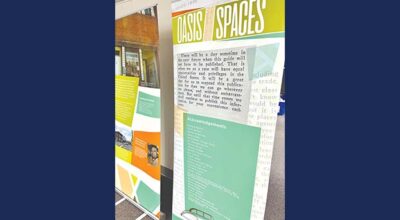City officials discuss library deficit
Published 8:43 pm Thursday, November 13, 2014
Although charging non-city residents for library cards who use the city-run Brown Library is an option when it comes to increasing revenue to help pay for operating the library, it’s an option that may not be implemented.
During its meeting Monday, the Washington City Council discussed deficits in two services it provides, the library and its Grace Martin Harwell Senior Center.
For years, city officials have said city taxpayers have been subsidizing the costs associated with non-city residents using Brown Library and city parks and recreation facilities. The city believes that because many county residents — those who live outside the city — participate in the city’s recreation programs, use city sports facilities and use city parks, the county should help cover some of the expenses associated with providing those programs and facilities.
Currently, the library is operating at an estimated $400,000 deficit annually. What concerns city officials is the amount of non-city residents who use the library and pay no taxes to support it, as city taxpayers do.
A city document shows the library is expected to generate $31,700 in revenue this fiscal year and expend $435,551, for a net cost of $403,851.
The document also shows that the library has 2,568 patrons who live in the city and 5,474 patrons who do not live in the city but live in Beaufort County. Sixty people who live outside Beaufort County are library patrons, according to the document.
The net-cost distribution, according to the document, would be $128,959 for city residents and $274,892 for Beaufort County residents who do not live in the city.
“Here we’ve got a facility, that based on the numbers, 60 percent if the participation is from county residents. We’re losing $400,000 a year, and we cannot continue to absorb a $400,000 a year operating deficit. We can sit here and make that statement from now until next July — every Monday — and it’s not going to help the problem. At some point in time, we’ve just got to bite the bullet and look at ways to either increase the revenues or cut the deficit,” Councilman Doug Mercer said. “That’s what we said we were going to do. I think we’ve taken the first steps. We at least recognize what the deficit is. I looked at the fees that are associated with this and I was really quite surprised that we suggest that we not charge county residents any fee. If you’re out of county, you buy your library card for $25. I would certainly think that if you’re a non-city resident there should be some fee charge there for the privilege of using that facility.”
Gloria Moore, director of Brown Library, explained why no such fee is charged.
“The only thing I was going to say is the reason is says not to charge Beaufort County borrowers is because you all have agreed to migrate to NC Cardinal (a partnership of libraries). With NC Cardinal, we can’t charge any of the NC Cardinal libraries, and BHM (Beaufort-Hyde-Martin Regional Library) is already a member of NC Cardinal … so you wouldn’t be able to charge them (residents of those counties) fees or any of the other member libraries in NC Cardinal,” Moore said.
Mercer asked, “What do we get out of NC Cardinal?”
Moore responded, “You get a savings of about $27,000 for the first two years.”
That statement got Mercer’s attention.
“$27,000 — and we’re losing $400,000,” he said.
City Manager Brian Alligood explained that NC Cardinal is a statewide sharing program that “would allow us to eliminate some of the costs we had on … checking out books and those kinds of things. So, from that perspective, it was a good measure for us to do that (join NC Cardinal). If you receive state grant aid, you’ve got to open your library as well. We’ve got to deal with the $400,000 deficit whether we’re in NC Cardinal or not.”
Alligood said the State Library of North Carolina requires libraries that receive aid from it to open their doors to the public.
“But if we refused state funding, we could open the doors as we chose to,” Mercer said.
“You could, and you’d still have a $400,000 deficit,” Alligood said.
“Agreed, at this point in time. But if you closed the doors and applied certain conditions on getting in, you could significantly reduce that 400 grand,” Mercer said.
“I guess you could. I think the take-away is that the city has been generous over the years and has provided county-level services both at the senior (center) level and at the library level. We need to work with the county to try to look at some additional funding streams to be able to do that because you guys have funded county-level services,” Alligood said.
Mercer said he and other council members, thanks to efforts by city staff, have a better understanding of deficits in some city-provided services.
“You’ve told me exactly how much money I’m losing. And, yes, we’ve been good guys for the last 30 years. And we’ve been putting money into the pot, putting money into the pot, and we just can’t continue to take out of our savings account to operate a system that operating at a substantial deficiency,” Mercer said.
Alligood said the city is not required to provide library services and operate a senior-citizens center, but he does not believe that’s an option the city would want to pursue.
For additional coverage of the council’s meeting, see future editions of the Washington Daily News.






